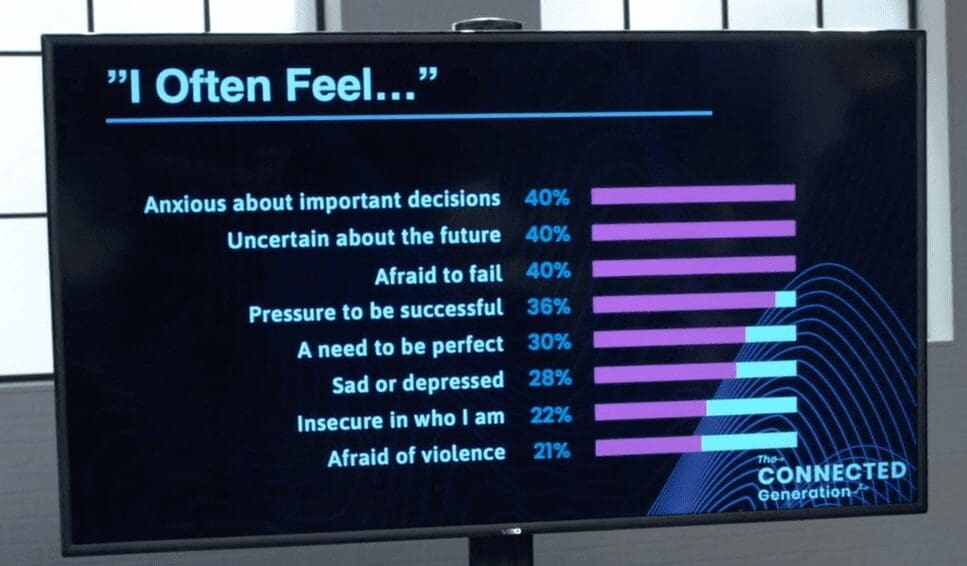Barna Research has been known for communicating uncomfortable truths to the church world. The research group’s most recent report on young adults, titled “The Connected Generation” asks the church to reconsider the generation that has often been labeled “lazy” and “entitled.” David Kinnaman, president of Barna, started a webinar that discussed the research by saying Millennials are “much talked at and often misunderstood.” He then turned the tables on those tuned in by saying maybe we should be asking who raised this generation.
“[This] generation feels the impact of broad, global trends more than they feel loved and supported by others close to them,” Kinnaman says. He describes young people ages 18-35 as the “connected generation” (hence the title of the report) and says that despite the access they have to other people living in other countries and information through devices, they are some of the loneliest, most anxious people living right now.
Things You Should Know About Millennials
In the book Kinnaman co-authored with Mark Marlock, Faith for Exiles, he likens our current global context to Babylon as described in the Bible. He says we’re existing in what could be called a “digital Babylon” where Christians are striving to live out their faith like the exiled Jews were in Babylon, where there were many, many gods to choose from. Never in the history of the world has humanity been so aware and so connected to all the things going on in all parts of the world. And yet, we are increasingly feeling more isolated and alone.
In light of this paradox, Kinnaman and the group of researchers who forged the Connected Generation project feel there are some things we may not truly understand about Millennials and Gen Z. Their research surveyed over 15,000 young adults ages 18-35 from 25 countries around the world. Some of the results are expected, while others may take you by surprise.
Millennials Suffer From Anxiety
A lot of young adults ages 18-35 suffer from anxiety. So much so that Barna actually concluded young adults are “plagued” by anxiety and loneliness. One in five respondents identified with statements such as “I’m sad” or “depressed”, “lonely”, “feel insecure in my identity”, “afraid to fail.” The research indicated is a lot of insecurity felt around profession and finances especially.
A stunning 75 percent of women surveyed said they feel uncertain about the future, and 47 percent of women said they feel anxiety over important life decisions. (Interestingly, only 34 percent of men felt that way when asked those two questions.) Conversely, less than half the respondents (40 percent) say they “feel optimistic about the future and only 34 percent said they “feel able to accomplish my goals.”
Why might young adults feel this way? One ministry leader Barna interviewed for the webinar, pastor Mark Sayers from Australia, suggested the “ambient anxiety” he sees in the global culture may come from the sheer amount of information we are required to process in a given day. He reasons our brains can only process a certain amount of information at a time before we get mentally exhausted. Given our connectedness to information thanks to technology, this deluge of content causes anxiety. People have to sort through an “incredible amount of narratives.” Additionally, he feels companies and people are constantly competing for our attention, and not everyone has the best motives.
Sayers says that as a pastor, he’s seeing the “real world effects” of this generation being “exploited by people who don’t have their welfare in mind.” He asks, “which generation of people have been marketed to more?”
Kinnaman points to an increasing feeling that the world is spinning out of control. Considering the majority (77 percent) of the connected generation feels that “events around the world matter” to them and they “feel connected to people around the world” (57 percent), things like climate change and economic instability can cause more angst than they might to other generations who don’t feel as connected to others globally.
Millennials Feel the Need for Community
As their anxiety levels increase, more and more Millennials feel the need for community. Tish Harrison Warner is a minister in Chicago who says that while she sees anxiety and a sense of disconnection increasing in her parishioners, she also sees a “deep yearning” for community.
While they may feel that deep yearning, though, Warren feels many of us haven’t learned the “skill” of having community. “I think we want community to be something the church can dispense like a drive through,” she says. We want community to be easily delivered and without it requiring a lot of time or risk on our end. The reality is, though, that community takes time, requires investment, and even sacrifice, Warren says.
So while many Millennials see the need for community, the implication suggested by the research is that they are not finding the community they long for. As Warren suggests, this may be because of unrealistic expectations and a lack of training on how they can seek or cultivate community.


